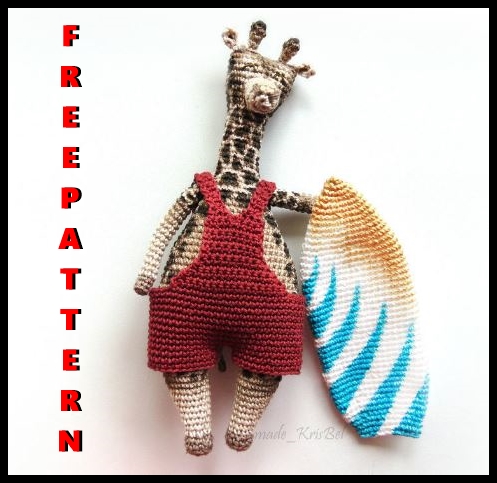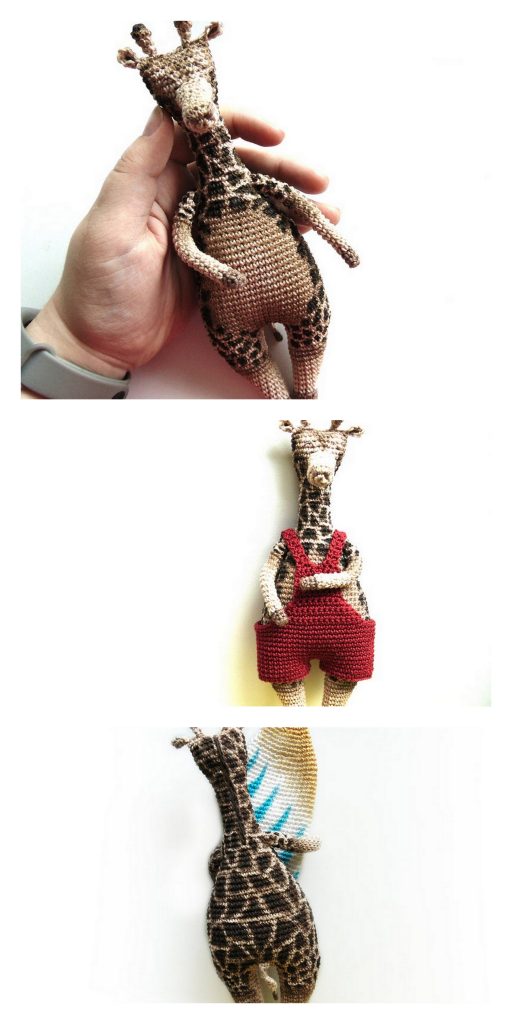
SURFER GIRAFFE AMIGURUMI FREE PATTERN
Hello amigurumi lovers and beautiful visitors, I wanted to share the free amigurumi patterns for you here. In my article I will share 1 pattern and how to make it for you. At the end of my article, I will share amigurumi patterns that can generate ideas for you.
Materials:
• beige yarn, I have Coco Vita cotton, color 3889;
• a piece of aluminum wire 14 cm long, 1.5 mm in diameter;
• a little dark brown thread of the same company;
• acrylic paints on fabric, I have Decola, brown, gold,
gold color;
• a suitable hook, I have # 1.5;
• white yarn, I have Narcissus, color 0101;
• a little red thread of the same company;
• filler, I have a synthetic winterizer;
• scissors.
Let’s move on to knitting:
Legs: 2 pieces
1p: dark brown thread, mr 6sc (6p)
2p: inc * 6 (12p)
3p: no changes (12p)
4p: (2sc, dec) * 3 (9p), change the thread to beige.
5p: no changes (9p)
6p: 4sc, inc, 4sc (10p)
7p: 5sc, inc, 4sc (11p)
8p: 5sc, inc, 5sc (12p)
9p: 6sc, inc, 5sc (13p)
10p: 6sc, inc, 6sc (14p)
11p: 7sc, inc, 6sc (15p)
12p: 7sc, inc, 7sc (16p)
13p: 8sc, inc, 7sc (17p)
14p: 8sc, inc, 8sc (18p)
15p: 9sc, inc, 8sc (19p)
16p: 9sc, inc, 9sc (20p)
17p: 10sc, inc, 9sc (21p)
18p: 10sc, inc, 10sc (22p), fasten and cut the thread.
For the second leg, repeat everything from 1p to 18p, but do not cut the thread, but continue.
19p: knit a chain of 4ch and attach the second with a connecting loop
leg. We tie in a circle 52sc (= 22 + 4 + 22 + 4).
At this stage, you can fill the legs a little with padding polyester:
Corpuscle:
20p-29r: no change (52p)
Further, we make all decavki exactly on the sides. In the photo I showed the marking, from
which the whole scheme is calculated. You don’t have to strictly follow the pattern
the main thing is to make two uniform deca on the sides:
30p: 11sc, dec, 24sc, dec, 13sc (50p)
31r: no change (50p)
32p: 11sc, dec, 23sc, dec, 12sc (48p)
33p: no change (48p)
34p: 11sc, dec, 22sc, dec, 11sc (46p)
35p: 10sc, dec, 21sc, dec, 11sc (44p)
36p: 10sc, dec, 20sc, dec, 10sc (42p)
37p: 10sc, dec, 19sc, dec, 9sc (40p)
38p: 9sc, dec, 18sc, dec, 9sc (38p)
39p: 9sc, dec, 17sc, dec, 8sc (36p)
40p: 9sc, dec, 16sc, dec, 7sc (34p)
41p: 8sc, dec, 15sc, dec, 7sc (32p)
42p: 8sc, dec, 14sc, dec, 6sc (30p)
43p: 8scdec, 13sc, dec, 5sc (28p)
44p: 7sc, dec, 12sc, dec, 5sc (26p)
45p: 7sc, dec, 11sc, dec, 4sc (24p)
46p: 7sc, dec, 10sc, dec, 3sc (22p)
Don’t forget to fill.
Neck:
50r-58r: no change (16p)
Head:
59p: 7sc, inc, 7sc, inc (18p)
60p: 8sc, inc, 8sc, inc (20p)
61p: 8sc, inc, 9sc, inc, 1sc (22p)
62p: 8sc, inc, 10sc, inc, 2sc (24p)
63p: 9sc, inc, 11sc, inc, 2sc (26p)
64r-68r: no changes (26p), we tie to the side 10sc, we fill
the resulting detail and sew.

Hands:
Cut off a piece of wire, 14cm long (if you use other
materials, length may vary). We insert in the places where they will be
look organic.
The ends of the wire can be bent so that later it does not break the knitted
the canvas, then we wrap it with the main thread in two layers.
1p: dark brown thread, mr 6sc (6p)
2p: behind. loop wall, unchanged (6p)
3p: no changes (6p)
4p: change the thread to beige, no changes (6p)
5p-9p: no change (6p)
10p: inc, 2sc, inc, 2sc (8p)
11p-21p: no changes (8p), fasten the thread. Thus, we knit two
details and sews to the calf, putting on the wire:
Ears: 2 parts
We collect a chain of 3ch and tie it with 7sc. Sew to the corners of the head:
Horns: 2 parts
1p: Mr, knit 7sc (7p), knit with a spiral
2p: no changes (7p)
3p-4p: dec, 1sc, dec, 1sc, dec, 1sc, dec, 3sc, sew to the head.
Muzzle:
1p: Mr, 6sc (6p)
2p: inc * 6 (12p)
3p-4p: no changes (12p)
5p: (1sc, dec) * 4 (8p)
6p: no changes (8p)
7p: (3sc, inc) * 2 (10p)
8p: (4sc, inc) * 2 (12p)
9p: (5sc, inc) * 2 (14p)
10p: no changes (14p), fill and sew to the head. Don’t forget to embroider
nostrils.
I immediately embroidered eyes, you can glue the eyes, or make your own.
Tail:
Cast on 10ch and chain 10sc. To the end of the ponytail, you can sew on a little black wool, but I want to leave it that way.
Mane:
We embroider the mane with a dark brown thread from the crown of the head to the end of the neck.
Since I have a very light thread, I subsequently dyed the giraffe’s mane
in the color of the specks.
Color:
This stage is the most important and at the same time almost
inexplicable. To give a similar color, I used fabric paints
by Decola. For lack of pure brown, I mixed red
and green equally. Then I added some thinner to
the same firm to give a lighter shade.
I advise, in order not to practice a lot, tie a separate sample from that
the same yarn of the same color and try to paint spots on it. Do not be afraid!
The spots are chaotic and do not have to be of a certain shape.
We take a brush and paint pointwise the upper parts of the paws, painting over each
single crochet, falling into a speck. Distance between spots
you need to do the same, but depending on their location. Spot sizes
we make it different: on the hands and feet the spots should be small and be
slightly apart from each other, while on the back and neck they should be
much larger and closer to each other.
Leave the belly light.
We paint the horns with a gradient: the top with the main dark color, and then
already dilutes the brush in water and lightly blend it all over the horn.
We paint the muzzle with diluted brown paint. The color should be
much paler than the color of the spots. For example, I dipped the brush into water, and then into
paint. Then I slightly tinted any of the spots and only after that
painted the muzzle Practice on a separate knitted fabric from
the same thread.
Paint the tail with a dark brown color at the tip.
Pants:
1p: dial a chain of 27ch, close in a circle, tie 27sc. Without changes
tie another 1p at 27sc. Cut the thread and fix it. Thus we knit
second detail.
3p: cast on 3ch and attach the second leg with a connecting loop,
tie in a circle 60sc (= 27 + 3 + 27 + 3). If you are using a different yarn,
then be sure to try on as you knit.
4p-6p: no change (60p)
7p: 26sc, 3ch, 1sc in the third loop from the hook, 30sc (60p), so we get
ponytail window.
8p-12p: no change (60p)
13p: 6sc, dec, turn knitting
14p: dec, 15sc, dec (17p), we turn knitting
15p: dec, 13sc, dec (15p), we turn knitting
16p: dec, 11sc, dec (13p), we turn knitting
17p: dec, 9sc, dec (11p), we turn knitting
18p: dec, 7sc, dec (9p), turn knitting
19p-24p: in rotary rows without changes (9p)
25p: we turn knitting, dec, 3sc, dec (5p)
26p: we turn knitting, dec, 1sc, dec (3p)
Next, we knit the strap in reverse rows.
27r-52r: no change (3p), thread
fasten and sew to the panties.
We attach the thread in 5sc24 rows.
We repeat all actions from 25p to 52r.
Sew on to the panties. So
thus we got two straps
beach suit.
Surfboard (surfboard):
1p: mr, 6sc
2p: no changes (6p)
3p: inc * 6 (12p)
4p-5p: no changes (12p)
6p: (1sc, inc) * 6 (18p)
7p-8p: no change (18p)
9p: (2sc, inc) * 6 (24p)
10p-11p: no change (24p)
12p: (3sc, inc) * 6 (30p)
13p-14p: no change (30p)
15p: (4sc, inc) * 6 (36p)
16r-42r: no change (36p)
43p: (4sc, dec) * 6 (30p)
44r: no change (30p)
45p: (3sc, dec) * 6 (24p)
46p-49p: no changes (24p), fix the thread, sew the edge so that
get a flat surface like a surfboard. You can glue the inside,
or sew in the middle to get a flat board.
Next, paint our surfboard with paints on the fabric. If desired
you can apply satin stitch embroidery.
Smooth loops!